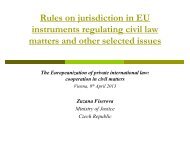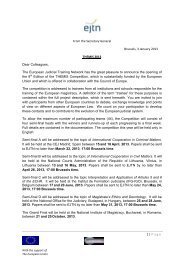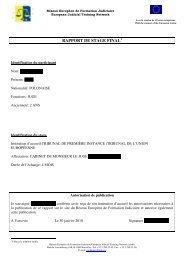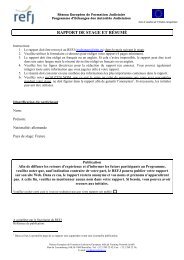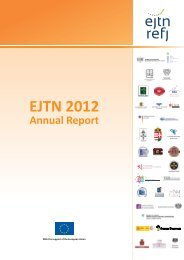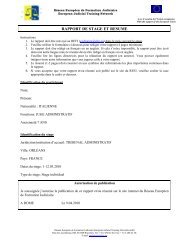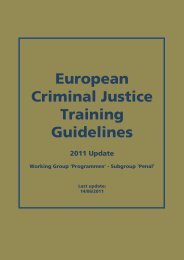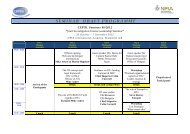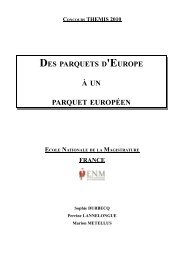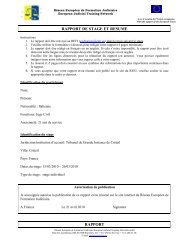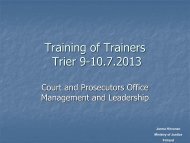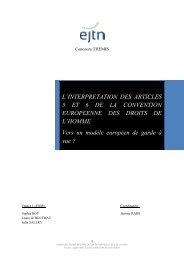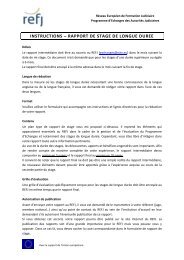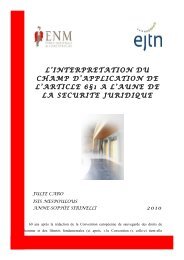Written paper Belgium_1.pdf - European Judicial Training Network
Written paper Belgium_1.pdf - European Judicial Training Network
Written paper Belgium_1.pdf - European Judicial Training Network
You also want an ePaper? Increase the reach of your titles
YUMPU automatically turns print PDFs into web optimized ePapers that Google loves.
espect to their judge. It can also provide reassurance that the citizens know that the judge is<br />
bound by certain obligations. Thereby they do not need to expect any randomness, which the<br />
confidence in justice will benefit.<br />
The opponents of codification rely on the fact that the ethical rules are time-bound and<br />
therefore in principle changeable. According to them codification leads to rigidity. The rules<br />
are supposed to be flexible to adapt to new conditions and to evolve. Codification would<br />
complicate this. 6<br />
In addition, codification could impede the development of a 'positive' deontology (supra).<br />
Chances are that the behavior of the magistrate will be compared in an abstract manner with<br />
the written rules only to sanction disciplinary breaches. Then the emphasis sets back to<br />
repression, rather than to achieve some common objectives<br />
3.The common standards of the Belgian unwritten ethics<br />
Starting from the idea of a 'positive' deontology one must obviously be able to determine to<br />
what common standards the actions of a magistrate, both in the performance of his duties and<br />
in his private life, must meet. It is also recommended that the magistrates themselves think<br />
about these standards. Indeed, these standards must be supported by the entire group and<br />
could not be imposed from 'above'.<br />
Since 1988 an open debate is going on in <strong>Belgium</strong> about what those policies might be.<br />
Capturing these standards, two findings are important: a) the magistrate has a lot of power,<br />
which necessarily must be kept within bounds; b) the litigant does not chose his judge.<br />
What would these principles be? 7 It is important to know that these next 4 standards constitute<br />
only one possible approach. An open debate on this topic should continue to be conducted,<br />
not only at national level but also at <strong>European</strong> 8 and at international 9 level.<br />
6 DERIEMAECKER, X., LONDERS, G., 'Deontologie en tucht', in Statuut en deontologie van de magistraat,<br />
Brugge, Die Keure, 317<br />
7 LONDERS, G., De tucht en de deontologie van de magistraat, in LUST, S., LUYPAERS, P. (eds.), Tucht en<br />
deontologie. (In)effectiviteit van het tuchtrecht ter handhaving van de waardigheid van het ambt., Die Keure,<br />
Brugge, 2007, 340-344<br />
8 “Avis n° 3 du CCJE à l'attention du comité des ministres du Conseil de l'Europe sur les principes et règles<br />
régissant les impératifs professionels applicables aux juges et en particulier la déontologie, les comportements<br />
incompatibles et l'impartialité” www.coe.int<br />
6



